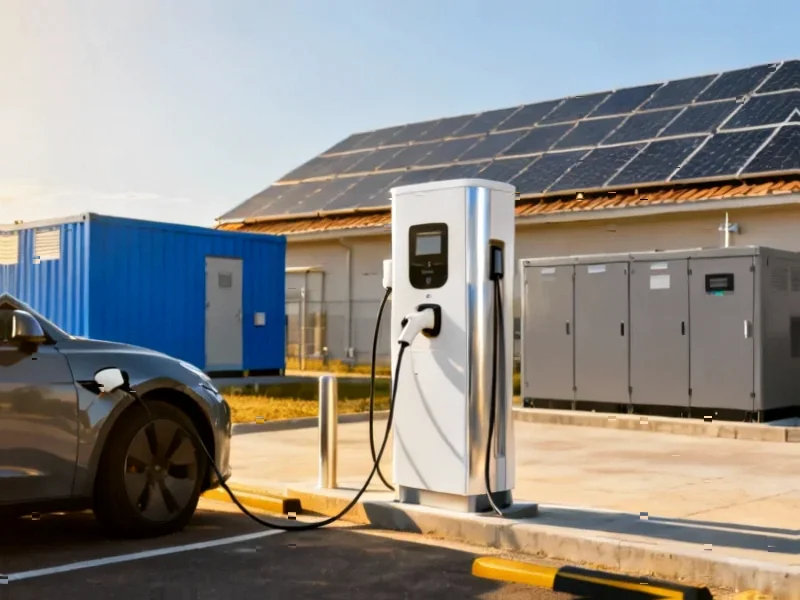According to Innovation News Network, the UK government has launched a £10 million funding package to develop off-grid electric vehicle charging stations that can operate without traditional grid connections. The initiative specifically targets England’s strategic road network of motorways and major A-roads, funding advanced charging technologies that combine renewable energy sources like solar and wind with on-site battery storage systems. Each supported project must provide ultra-rapid charging for at least 12 EVs simultaneously, delivering 120-145 miles of range in just 15 minutes – enough for journeys like Birmingham to York. The program complements existing EV incentives including the £650 million Electric Car Grant that has already supported over 25,000 drivers with discounts up to £3,750. This strategic investment marks a significant shift in how the UK approaches EV infrastructure challenges.
The Technical Architecture Behind Off-Grid Charging
The real innovation here lies in the energy management systems that must balance intermittent renewable generation with high-power charging demands. Unlike traditional charging stations that simply draw from the grid, these off-grid systems require sophisticated power electronics to manage multiple energy sources simultaneously. Solar arrays and wind turbines provide the primary generation, but the critical component is the battery storage system that acts as a buffer – storing energy during periods of high generation and releasing it during charging events. The engineering challenge involves designing systems that can handle the massive power requirements of ultra-rapid charging (typically 150-350 kW per vehicle) while maintaining stability across the microgrid. This requires advanced battery chemistry capable of high discharge rates and sophisticated power conversion systems that can manage the transition between energy sources seamlessly.
Addressing the UK’s Grid Infrastructure Limitations
This initiative directly confronts a fundamental constraint in the UK’s energy infrastructure: the limited capacity of high-voltage grid connections in rural and remote areas. Traditional grid upgrades for high-power charging stations can cost millions and take years to complete, creating a chicken-and-egg problem for EV adoption outside urban centers. By bypassing these constraints, the government is enabling a parallel deployment strategy that doesn’t wait for national grid improvements. The technical approach essentially creates distributed energy hubs that function independently while potentially feeding excess power back to the grid when available. This represents a strategic shift from centralized to decentralized energy management for transportation, mirroring trends we’ve seen in renewable energy generation where distributed resources are increasingly supplementing traditional power plants.
The Hidden Challenges of Off-Grid Reliability
While the concept is promising, the implementation faces significant technical hurdles that the funding must address. The most critical challenge is ensuring reliability during periods of low renewable generation – what happens during a week of cloudy weather with minimal wind? Systems will need substantial battery storage capacity or backup generators to maintain availability, which increases costs and complexity. Another challenge involves maintenance in remote locations; unlike grid-connected stations that can be monitored and managed centrally, off-grid systems require robust remote monitoring and potentially more frequent physical maintenance. The power quality and consistency also present engineering challenges – maintaining stable voltage and frequency while multiple vehicles charge simultaneously requires sophisticated power electronics that can handle rapid load changes without compromising the charging experience.
Transforming the Economics of Rural EV Infrastructure
This funding could fundamentally change the business case for charging infrastructure in underserved areas. Traditional charging station economics have struggled in rural locations due to low utilization rates and high grid connection costs. By eliminating the grid connection expense and leveraging renewable energy with falling cost curves, operators can achieve profitability with lower utilization. The requirement for 12 simultaneous charging points suggests these will function as destination charging hubs rather than simple roadside stops, potentially incorporating amenities that increase revenue streams. This model could create new business opportunities for landowners and local entrepreneurs in rural areas, transforming what has been a infrastructure challenge into an economic development opportunity. The technology developed through this program could also become an export opportunity for UK engineering firms as other countries face similar rural electrification challenges.
The Road Ahead for Distributed Charging Networks
Looking forward, this initiative represents just the beginning of a broader transformation in how we think about transportation energy infrastructure. The combination of renewable generation, battery storage, and smart charging management creates a template for truly sustainable transportation that doesn’t simply shift emissions from tailpipes to power plants. As battery technology continues to improve and costs decline, we’re likely to see more sophisticated energy trading between these stations and local grids, creating virtual power plants that can support grid stability. The success of this program will depend not just on the technology development but on creating sustainable business models that can scale without continued government support. If successful, it could provide a blueprint for how countries with similar infrastructure challenges can accelerate their EV transitions without waiting for comprehensive grid upgrades.





Your point of view caught my eye and was very interesting. Thanks. I have a question for you.